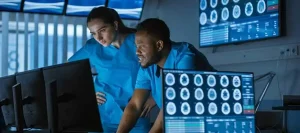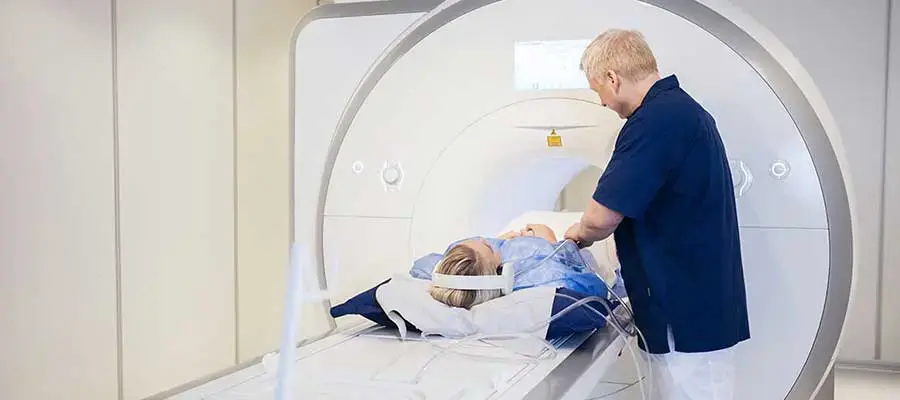Discover everything about MRI Tech School programs, top courses, earning potential, and career paths to help you start a rewarding career in MRI technology. The core of modern sophisticated diagnostics noninvasive equipment, such as MRI (Magnetic Resonance Imaging) allows medical practitioners to look inside the human body to identify the location of injuries with no harm to the patient. MRI technologists’ demand is on the rise, therefore guaranteeing job consideration on this line would be wiser.
In this complete guide, you’ll learn about MRI tech school: the program types, the best schools, courses to take, certifications, salaries, and more if you want to become an MRI technologist. When you come to the end of this post, you will understand how to venture into MRI technology as a profession and what to anticipate as you work through the process.
What is an MRI Tech School?
MRI tech school is known as to provide training for any student who intends to becoming an MRI technologist. These schools give knowledge and skills required to operate MRI machines, produce quality images and assist physicians in diagnosing their patients. When it comes to programs offered durations and types of programs are different, degree and certificate program offered depending on the student need, career objectives and experience level.
For more interesting articles visit Business to World.
MRI Degree and Certificate Programs
-
MRI Certificate Programs
Certificate programs in MRI technology are normally intended for students who already possess some nursing or radiologic background. Some of them are less than degree programs taking between six months and one year, and also are specialized in MRI skills and operation of equipment’s. Certificate programs are ideal for any radiologic technologist who wish to practice MRI but does not want to undergo a degree program.
-
MRI Technology and Related Associate Degree Programs
A two-year program of MRI technology is commonly aimed at fresh-entry students and is an associate degree. It is a broad program that ensures students get tough knowledge areas of the human body structure and functions, mechanics, handling of patients and application of imaging procedures. Associate courses are designed in such a way that they blend lecture with clinical, and upon completion of the program, graduates are ready to write ARRT certification exam to get junior MRI technology jobs.
-
Degree of Bachelor’s offered for MRI Technologists
For more practice-oriented education, there exists a bachelor’s degree in MRI technology or radiologic sciences for students. This program normally takes four years to complete and requires general (nonprofessional) MRI courses. A bachelor’s degree may well present career prospects and employment advantage over others. Graduates may also seek, jobs in administration, teaching or in the more specialized imaging fields.

Top 8 MRI Tech Schools: Complete Details
Here is a list of some of the top MRI tech schools known for their quality programs, faculty, and resources:-
-
University of Pennsylvania – Philadelphia, PA
- Program Offered: A Bachelor of Science in Radiologic Science
- Program Length: 4 years
- Highlights: Focus on students’ clinical experience assisted by the latest MRI technologies, a chance to cooperate with the most famous Pennsylvania hospitals.
-
Mayo Clinic School of Health Sciences – Rochester
- Program Offered: AAS in Radiologic Technology, Option: MRI
- Program Length: 2 years
- Highlights: Open admittance to the Mayo Clinic medical centrums, little number classes, and the immediate supervision of experienced MRI technologists.
-
Johns Hopkins University – Baltimore, United States of America
- Program Offered: Certificate in MRI Technology
- Program Length: 6-12 months
- Highlights: Intended for working professional current healthcare practitioners; students get experience from Johns Hopkins Hospital.
-
University of Iowa – Iowa IA
- Program Offered: Bachelor of Science in Radiation Sciences with a major in MRI.
- Program Length: 4 years
- Highlights: Advanced imaging required facilities; they show their focus on research and development in MRI technology largely.
-
Emory University – Atlanta, GA
- Program Offered: MRI TECHNOLOGY ASSOCIATE AND CERTIFICATE PROGRAMS
- Program Length: 1-2 years
- Highlights: It is ranked among the best medical schools; the student participates practical assignment in leading Atlanta hospitals.
-
Ohio State University Columbus – Columbus Ohio
- Program Offered: Radiologic Technology degree in Radiologic Science and Therapy and Magnetic Resonance Imaging, MRI
- Program Length: 4 years
- Highlights: Programs feature clinical practicum, research undertakings and a chance to handle with modern MRI equipment.
-
Wisconsin Milwaukee University – Milwaukee, WI
- Program Offered: Bachelor’s and Certificate programs – MRI
- Program Length: 1-4 years depending on the program the student is undertaking.
- Highlights: Separate facility for MRI simulation and well-equipped department infrastructure, extensive faculty backing, and connection with medical facilities.
-
Northwestern University – Evanston II
- Program Offered: MRI Certificate Program
- Program Length: 9-12 months
- Highlights: Emphasizes practical experience; clinical experiences in the most reputed hospitals in the Chicago area.
All of these schools have their benefits, and students should focus on their necessities for the future job, cost, and location options for a program.
Elective Courses: MRI Tech School
MRI programs tend to have mandatory courses and courses that are recommended and given the flexibility of student choice, most students can obtain specialized skills. Electives may include:-
Advanced MRI Physics
Provides an overview of the concepts contained in MRI technology with a more detailed explanation of magnetic fields and signals.
Cross-sectional Anatomy
Specializes in the spatial orientation of the human body in the different planes employed when creating images.
MRI Safety and Ethics
Provides guidelines in the management of safety for the patient and the operator with regards to contrast media and MRI risks.
Pediatric MRI Imaging
Looks at some special aspects of patient care that are specific to pediatric clients.
These elective courses enable the students to acquire profound specialization in various aspects to meet the dynamism of the roles encompassing this area.
MRI Tech School Accreditation Programs
MRI tech accreditation assures the public that the programs being offered conforms to the national requirement on quality and education. At present, the Joint Review Committee on Education in Radiologic Technology (JRCERT) is the leading central accrediting agency for MRI programs in the United States. JRCERT accreditation is crucial as it made certain that the program achieves the standard in education and made sure that the program is accredited with the ARRT and is required for certification.
It remains important when selecting a MRI tech school to ensure that the program is accredited by JRCERT for it determines both the quality of education and examination certification examinations.
How Much Does an MRI Technologist Make?
According to the earnings, the job offer prospects for MRI technologists are quite encouraging as more patients seek the services of MRI technologists. Here are the latest average salary details:-
Average Annual Salary
MRI technologist salary per annum across the United States is around $74,690, courtesy the United States Bureau of Labor Statistics.
Entry-Level Salary
The first experience MRI techs annual wages are normally around $50, 000 – $60, 000 depending on the region and health care facility they are working for.
Experienced Salary
MRI technologists with the most experience along with those having extra certification, can earn well over $90,000 per annum.
It is seniority, geographical location and the healthcare facility that determines the pay scale for the staff. Likely, technologists who work in large urban areas or in specific healthcare facilities will be paid more.

MRI Technologist Professional Avails
Career opportunities for MRI technologists are strong, with a range of employment settings and advancement opportunities:-
Hospitals
Many MRI technologists are employed in hospitals, so that they engage in diagnosis, interact with radiologists, and contribute to the treatment.
Outpatient Centers
Magnetic resonance imaging technicians also find employment in outpatient departments because they are used to perform diagnostic examinations in less stressed conditions than inpatients.
Specialty Clinics
Hospitals with specialized clinics for neurology, orthopedic or oncology department hire MRI technologist for special higher end imaging of some parts of body.
Research Facilities
MRI technologists can also work in research, how the brain function or how we may detect cancer otherwise.
Teaching and Training
Though some MRI technologists are experienced in their profession some of them may become trainers or instructors in MRI programs that are offered in various colleges or universities or they can further train other new MRI technologists employed in various health care facilities.
The BLS expects a 9% growth rate in MRI technologists from 2022 to 2032, a rate that is higher than average, and the demand for job-seekers fresh from school shows there is strong demand for the role of MRI technologists.
Conclusion
MRI technologist is an excellent employment opportunity for the candidates interested in medical equipment field. Pay scales are usually relatively generous, job progression prospects are numerous, and work allows for helping patients live better lives. As one can learn, steps towards achieving a carrier in MRI involve getting the right education and training from an accredited MRI tech school. Having all the information above, you are ready to proceed further along your journey to becoming an MRI technologist.

